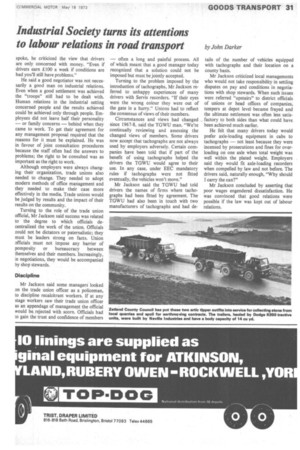Industrial Society turns its attentions
Page 33

If you've noticed an error in this article please click here to report it so we can fix it.
to labour relations in road transport by John Darker
spoke, he criticized the view that drivers are only concerned with money. "Even if drivers earn £100 a week if conditions are bad you'll still have problems."
He said a good negotiator was not necessarily a good man on industrial relations. Even when a good settlement was achieved the "troops" still had to be dealt with. Human relations in the industrial setting concerned people and the results achieved could be achieved only through people. Employees did not leave half their personality — or family concerns — behind when they came to work. To get their agreement for any management proposal required that the reasons for it must be explained. He was in favour of joint consultation procedures because the staff often had the answers to problems; the right to be consulted was as important as the right to work.
Although employers were always changing their organization, trade unions also needed to change. They needed to adopt modern methods of office management and they needed to make their case more effectively in the media. Trade unions would be judged by results and the impact of their results on the community.
Turning to the role of the trade union official, Mr Jackson said success was related to the degree to which officials decentralized the work of the union. Officials could not be dictators or paternalistic; they must be leaders strong on facts. Union officials must not impose any barrier of pomposity or bureaucracy between themselves and their members. Increasingly, in negotiations, they would be accompanied by shop stewards.
Discipline Mr Jackson said some managers looked on the trade union officer as a policeman, to discipline recalcitrant workers. If at any stage workers saw their trade union officer as an appendage of management the official would be rejected with scorn. Officials had to gain the trust and confidence of members — often a long and painful process. All of which meant that a good manager today recognized that a solution could not be imposed but must be jointly accepted.
Turning to the problem imposed by the introduction of tachographs, Mr Jackson referred to unhappy experiences of many drivers with Servis recorders. "If their eyes were the wrong colour they were out of the gate in a hurry." Unions had to reflect the consensus of views of their members.
Circumstances and views had changed since 1967-8, said the TGWU man. "We're continually reviewing and assessing the changed views of members. Some drivers now accept that tachographs are not always used by employers adversely. Certain companies have been told that if part of the benefit of using tachographs helped the drivers the TGWU would agree to their use. In any case, under EEC mandatory rules if tachographs were not fitted eventually, the vehicles won't move."
Mr Jackson said the TGWU had told drivers the names of firms where tachographs had been fitted by agreement. The TGWU had also been in touch with two manufacturers of tachographs and had de
tails of the number of vehicles equipped with tachographs and their location on a county basis.
Mr Jackson criticized local managements who would not take responsibility in settling disputes on pay and conditions in negotiations with shop stewards. When such issues were referred "upstairs" to district officials of unions or head offices of companies, tempers at depot level became frayed and the ultimate settlement was often less satisfactory to both sides than what could have been achieved much earlier.
He felt that many drivers today would prefer axle-loading equipment in cabs to tachographs — not least because they were incensed by prosecutions and fines for overloading on one axle when total weight was well within the plated weight. Employers said they would fit axle-loading recorders when compelled by law and not before. The drivers said, naturally enough, "Why should I carry the can?"
Mr Jackson concluded by asserting that poor wages engendered dissatisfaction. He was convinced that good relations were possible if the law was kept out of labour relations.
















































































































